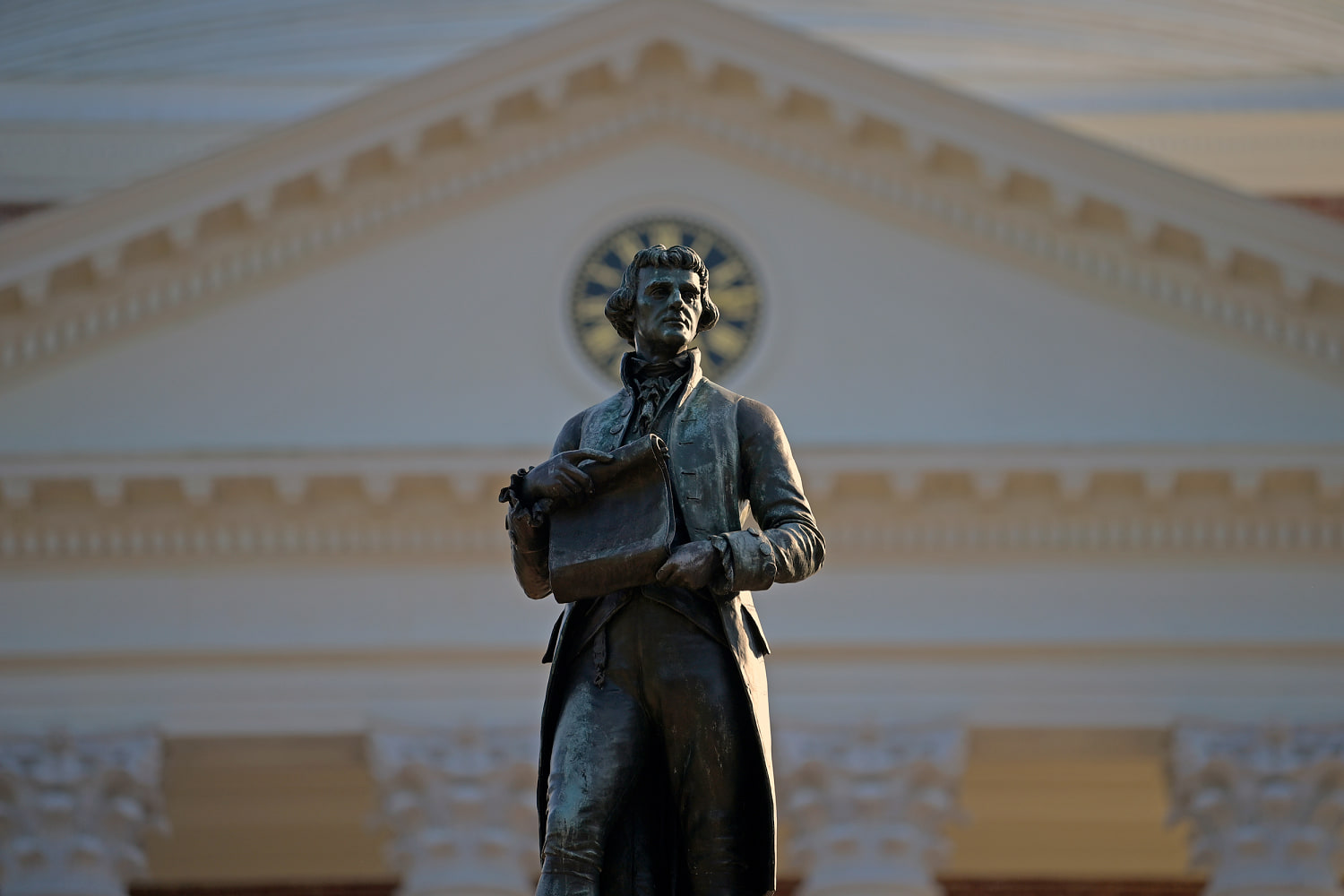
In taking credit for the suspension of a University of Virginia student-led tour program that was less than flattering for the school’s founder, Thomas Jefferson, Thomas Neale, a 1974 alum and president of the conservative Jefferson Council, said his group merely wants tours that provide more context about who Jefferson was.
Students who are a part of the University Guide Service have provided tours of UVA for visitors, including prospective students and their families. A co-founder of the Jefferson Council said on the council’s website in 2021 that “the University Guides now seem intent on ‘contextualizing’ Mr. Jefferson as a slave holder and rapist, and to completely undermine his part of the Founding of America and our University.”
Thomas Neale, a 1974 alum and president of the conservative Jefferson Council, said his group merely wants tours that provide more context about who Jefferson was.
The student group, which wants to resume its tours, said in a statement to The Cavalier Daily, “We believe our mission is better fulfilled when we can offer tours in collaboration with the University. This will remain true so long as this relationship does not harm our ability to share an honest and complete account of U.Va. and its history.”
In an interview with NBC News, Neale claimed victory for the suspension of the student-led tours inasmuch as the Jefferson Council is now responsible for 13 of the university’s 17 trustees, and those 13, he said, “looked at this and said this has to change.”
According to NBC News, Neale “insisted his group doesn’t want a whitewashing of Jefferson’s status as a slaveowner, but a greater contextualization of America’s third president and Declaration of Independence author.” That report says that Neale believes “it should be taught that Jefferson signed into law, in 1807, the prohibition against the importation of slaves.”
Be careful what you wish for, Mr. Neale. Because, as we wrote in our book “The American Slave Coast,” the context you call for doesn’t reflect favorably on the nation’s third president.
Yes, Jefferson did push through the law prohibiting the unpopular practice of importing enslaved people from the African continent. But contrary to the myths that spin that as a humanitarian act, the prohibition of the trans-Atlantic slave trade was protectionism for Jefferson and the planters in Virginia and Maryland that he represented. If he were acting out of humanitarian concerns, then he’d have pushed to end slavery altogether and grant personhood to the formerly enslaved, but that would have pauperized Jefferson and his most enthusiastic supporters.
Neale wants Jefferson to have credit for ending the trans-Atlantic slave trade. But that means giving him credit for playing a foundational role in the domestic slave trade and its concomitant slave-breeding industry. If plantation owners who worked their human property to death in the brutal heat of, say, Tennessee or Mississippi could no longer buy kidnapped victims from Africa, then they’d have to go to Maryland or to the No. 1 supplier of young bodies for the emerging interstate slave trade: Jefferson’s Virginia.
Jefferson, it must be recalled, had also just purchased the Louisiana Territory from Napoleon, vastly expanding the territory for slave labor and thereby driving up the value of the human beings that Virginians were raising for sale. The new generation of Louisiana planters resented having to buy laborers from the Chesapeake instead of cheaper human chattel from Africa, but, thanks to Jefferson, they had no choice.
If he were acting out of humanitarian concerns, then he’d have pushed to end slavery altogether.
Neale, the president of the Jefferson Council, says he wants greater contextualization for Jefferson, but adding in the context would tell us why Jefferson’s reputation has been going downhill since Mr. Neale’s college days half a century ago. It’s not just because he owned slaves or fathered children with an enslaved woman who had no right to tell him no, or even because of his influential and utterly racist book Notes on the State of Virginia, in which he elaborated a pseudo-scientific view of Black people as intellectually less capable and thus became a founding theorist of white supremacy in the new United States. It’s that he was a driver of an industry that bred human beings like livestock.
Despite the importance of the school’s founder to UVA’s brand, this is what it means to put Jefferson in context.
So yes, teach that Jefferson signed into law the prohibition against the importation of persons. But also teach that the law he signed did nothing to end American slavery and arguably made it even more cruel.
